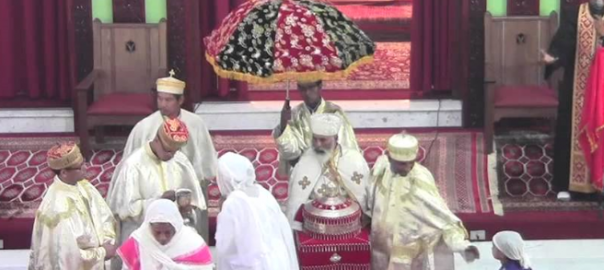“You prepare a table before me in the presence of my enemies.” (Ps 23:5)
In the Sacrament of the Eucharist, believers eat Lord Jesus Christ’s Holy Body and drink His precious Blood under the physical appearance of bread and wine. This Sacrament is called the Sacrament of all Sacraments and/or the crown of the Sacraments.
Institution of the sacrament
Our Lord instituted this Sacrament on Covenant Thursday, just a few hours before His arrest and trial. After He had washed the feet of the disciples as a sign of their repentance and preparation, “He took bread, blessed it and broke it, and gave it to the disciples and said, ‘Take, eat; this is My body.’ Then He took the cup, and gave thanks, and gave it to them, saying, ‘Drink from it all of you. For this is My blood of the new covenant, which is shed for many for the remission of sins’” (Mt 26:26-28)
St. Paul said, “The Lord Jesus on the same night in which He was betrayed took bread; and when He had given thanks, He broke it and said, ‘Take, eat; this is My body which is broken for you; do this in remembrance of Me.’ In the same manner He also took the cup after supper, saying, ‘This cup is the new covenant in My blood. This do, as often as you drink it, in remembrance of Me.’ For as often as you eat this bread and drink this cup, you proclaim the Lord’s death till He comes” (1 Cor 11:23-26)
Regarding the changing of the bread and wine into the body and blood of Christ
Our Lord spoke about this Sacrament openly to the Jews but they “quarreled among themselves saying, ‘How can this Man give us His flesh to eat?’” (Jn 6:52). Moreover, many of the disciples protested saying, “This is a hard saying; who can understand it?” (Jn 6:60). When Lord Jesus explicitly emphasized His real presence in the Sacrament, it was written, “many of His disciples went back and walked with Him no more” (Jn 6:66).
“[Jesus Christ], by his own will, once changed water into wine at Cana of Galilee. So why should we not believe that he can change wine into blood? … We should therefore have full assurance that we are sharing in the body and blood of Christ. For in the type of bread, his body is given to you, and in the type of wine, his blood is given to you, so that by partaking of the body and blood of Christ you may become of one body and one blood with Him.” (St. Cyril of Jerusalem).
St. John of Damascus wrote the following about the question of how this transformation of the bread and wine takes place;
- “And now you ask how the bread becomes the body of Christ, and the wine and the water become the blood of Christ. I shall tell you. The Holy Spirit comes upon them, and achieves things which surpass every word and thought … Let it be enough for you to understand that this takes place by the Holy Spirit” (St. John of Damascus).
Benefits of the sacrament
- Abiding in Lord Jesus Christ: “He who eats My flesh and drinks My blood abides in Me, and I in him” (Jn 6:56). Consequently we bear the fruits of the spirit, “He who abides in Me, and I in him, bears much fruit; for without Me you can do nothing” (Jn 15:5)
- Obtaining Eternal Life: “Whoever eats My flesh and drinks My blood has eternal life, and I will raise him up at the last day… He who eats this bread will live forever” (Jn 6:54,58)
- Growth & Maintenance of Our Spiritual Life: “Unless you eat the flesh of the Son of Man and drink His blood, you have no life in you… For My flesh is food indeed, and My blood is drink indeed… he who feeds on Me will live because of Me” (Jn 6:53,55,57)
- Salvation & Remission of Sins: “This is My blood of the new covenant, which is shed for many for the remission of sins” (Mt 26:28)
- Unification of Believers: “For we, being many, are one bread and one body; for we all partake of that one bread” (1 Cor 10:17)

